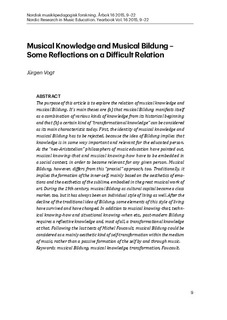| dc.description.abstract | ABSTRACT
The purpose of this article is to explore the relation of musical knowledge and musical Bildung. It´s main theses are (a) that musical Bildung manifests itself as a combination of various kinds of knowledge from its historical beginning and that (b) a certain kind of “transformational knowledge” can be considered as its main characteristic today. First, the identity of musical knowledge and musical Bildung has to be rejected, because the idea of Bildung implies that knowledge is in some way important and relevant for the educated person. As the “neo-Aristotelian” philosophers of music education have pointed out, musical knowing-that and musical knowing-how have to be embedded in a social context, in order to become relevant for any given person. Musical Bildung, however, differs from this “praxial” approach, too. Traditionally, it implies the formation of the inner-self, mainly based on the aesthetics of emotions and the aesthetics of the sublime, embodied in the great musical work of art. During the 19th century, musical Bildung as cultural capital became a class marker, too, but it has always been an individual style of living as well. After the decline of the traditional idea of Bildung, some elements of this style of living have survived and have changed. In addition to musical knowing-that, technical knowing-how and situational knowing-when etc., post-modern Bildung requires a reflective knowledge and, most of all, a transformational knowledge at that. Following the last texts of Michel Foucault, musical Bildung could be considered as a mainly aesthetic kind of self-transformation within the medium of music, rather than a passive formation of the self by and through music.
Keywords: musical Bildung, musical knowledge, transformation, Foucault. | nb_NO |
